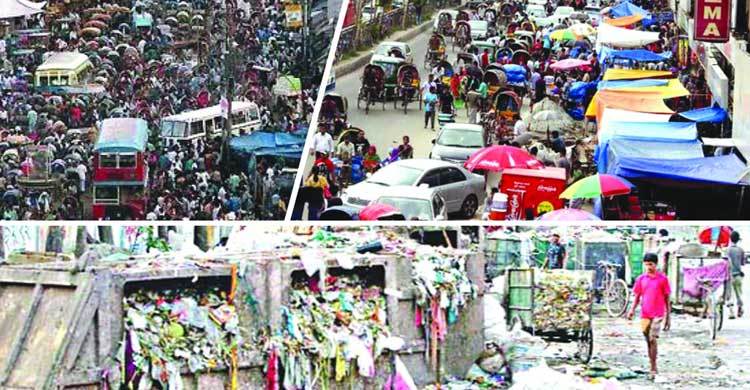Dhaka among world’s 9 worst cities

Some of the world’s major cities are becoming tougher places to live due to rising political and social unrest, as well as growing threats of terrorism.
The Economist Intelligence Unit report, which ranks the best and worst cities to live in the world, found that 10 cities in Western Europe suffered falls in liveability in the wake of attacks in Paris and Brussels.
‘Factors such as social unrest in many US cities due to the deaths of black people in police custody, tensions in Eastern Europe and Asia and the ongoing civil wars in Ukraine, Syria and Libya have led to greater security concerns and compounded this decline,’ the report added.
The EIU’s Global Liveability Ranking provides scores out of 100 for lifestyle challenges in 140 cities worldwide. It looks at which cities have the best living and worst living conditions.
The ranking takes into account healthcare, education, infrastructure, safety, and the threat of terrorism. It then gives an overall mark out of 100.
The EIU said ‘the survey is designed to address a range of cities or business centres that people might want to live in or visit.
Although few could currently argue that Damascus and Tripoli are likely to attract visitors, their inclusion in the survey reflects cities that were deemed relatively stable just a few years ago.’
After looking at the nine best cities to live in the world, Business Insider decided to take a look at the worst cities to live in the world.
9. Douala, Cameroon - It is perhaps unsurprising the African city made the worst city list, as it scores very poorly across healthcare, education, infrastructure, and culture and environment.
However, a higher stability score helped keep it from the top spot.
8. Harare, Zimbabwe - The African city may still be one of the worst cities to live in the world due to having the worst score out of 140 countries for healthcare, one of the worst for infrastructure, as well as continual social unrest.
However, it has one of the most improved liveability scores over the last five years.
T=6. Karachi, Pakistan - This city had one of the lowest scores for stability and for culture and environment. However, a modest score for education at 66.7 helped keep it from topping the worst cities to live ranking.
T=6. Algiers, Algeria - The city tied with Karachi with an overall score of 40.9 due to scoring under 50 for all categories including stability, infrastructure, healthcare, and education.
5. Port Moresby, Papua New Guinea - The city’s stability is super-low at 30 as political and social unrest is continual. Its healthcare score is also one of the worst in the world.
4. Dhaka, Bangladesh - The EIU said that ‘violent acts of terrorism’ in Bangladesh have taken their toll on the city’s liveability ranking, as it has the lowest score for infrastructure out of the 140 cities surveyed.
3. Lagos, Nigeria - The city has the worst score for stability at 10. ‘Continued threat from groups like Boko Haram acts as a constraint to improving stability in Lagos, Nigeria’s largest city,’ says the EIU.
2. Tripoli, Libya – ‘Escalations in hostilities in Libya have prompted a sharp decline in liveability in Tripoli as the threat to stability from Islamic State (IS, an extreme global jihadi group) continues to spread across the Middle East and North Africa,’ said the EIU.
1. Damascus, Syria - The city was relatively stable years ago but it remains ‘the subject of high-profile armed conflicts,’ said the EIU.
‘Conflict is responsible for many of the lowest scores. This is not only because stability indicators have the highest single scores but also because factors defining stability spread to have an adverse effect on other categories,’ it added.


